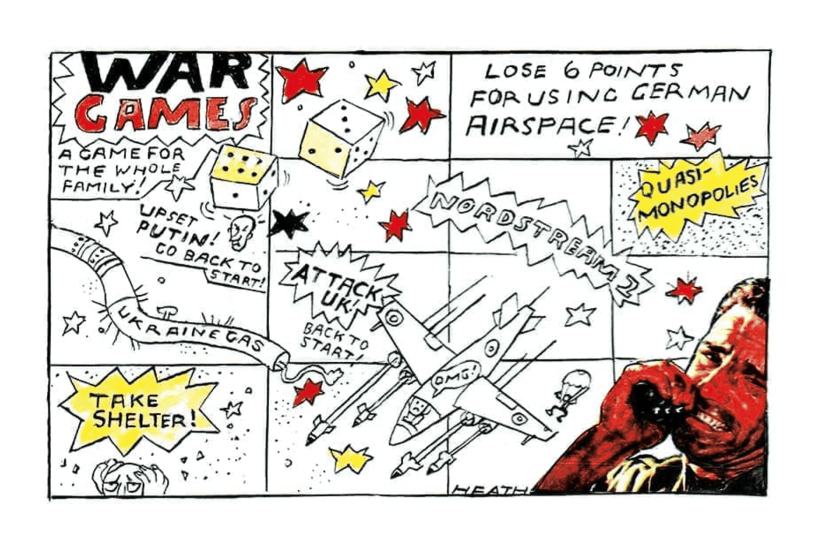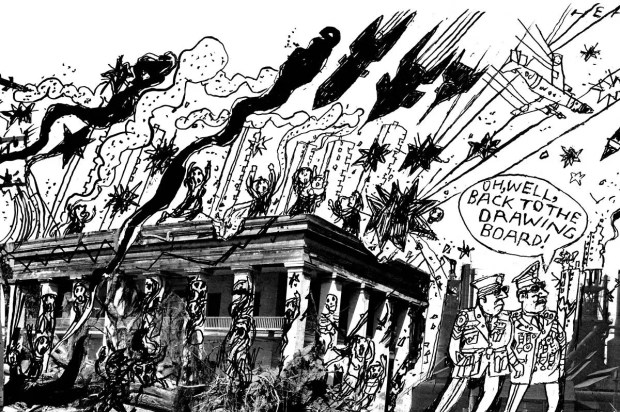Every time I hear a politician speak of Munich, I suspect that something is amiss. Last week, President Zelensky accused former US Secretary of State Henry Kissinger of living in the ‘deep past’, and demanding that ‘a part of Ukraine be given to Russia’. ‘It seems that Mr. Kissinger has 1938 on the calendar instead of 2022’, Zelensky said.
He wasn’t alone: figures from the Dutch Prime Minister Mark Rutte to the former chess champion Garry Kasparov put themselves on the record timidly or violently disagreeing with Kissinger. I wasn’t at Davos, but I learned of Kissinger’s revelations through Twitter. A major newspaper had declared that he ‘came close to calling on the West to bully Ukraine into accepting negotiations on terms that fall very far short of its current war aims’.
Still, terrified by all the commotion, I hurried to the website of the World Economic Forum, which posted both the transcript and the video of Kissinger’s remarks. It turned out that Kissinger merely called for peace negotiations, adding that ‘ideally, the dividing line should return to the status quo ante’.
Much of the excitement over his words stemmed from people either not reading what he said or from wilfully misinterpreting his words as a pre-emptive strike against possible negotiations with Russia. Kissinger was calling for a return to the lines of 23 February – the day before the invasion – which, if achieved, would amount to a humiliating blow to Putin. Which part of that defeat rhymes with Munich?
The lamentable episode with Kissinger points to the terrible vagueness of our political narratives, amplified and dumbed down by social media. Kissinger’s detractors accuse him of attempting to ‘cede’ Ukrainian territory without ever explaining what territory they are referring to. They talk about ‘defeating’ Putin without explaining what this defeat might look like. Russia must be weakened, we are told, to a point where it can never again invade Ukraine. No one knows what this means, or how it is to be accomplished.
Russia illegally annexed Crimea in 2014, and has supported the unrecognised separatist statelets of Donetsk and Luhansk in eastern Ukraine. If achieving a ceasefire based on the lines of 23 February is ‘ceding territory’, then, one might ask, on what basis could a ceasefire be achieved? Would it require pushing Russia out of the separatist statelets and out of Crimea?
If so, this would be a very different war from the fight the Ukrainians are waging now, for they would face a hostile population and a considerably more motivated Russian army fighting for the ground it has held for the last eight years. It is politically inconvenient to articulate such scenarios, though Kissinger did, with bluntness worthy of a 99-year old. This, he said, would ‘turn it into a war… not about the freedom of Ukraine… but [a war] against Russia’.
The prospect of Ukraine pushing Russia back to the lines of 23 February remains very uncertain. The liberation of Donetsk and Luhansk and/or Crimea (especially the latter) is, for now at least, highly unlikely. Even Zelensky himself repeatedly claimed that reaching the lines of 23 February would amount to a victory for Ukraine. Why, then, have Kissinger’s words about negotiations based on the status quo ante caused such an outcry?
It is only after the two sides have sufficiently exhausted themselves that peace talks can begin in earnest. Russia and Ukraine are not at this point yet. The war has already lasted for three months. When your side is gaining ground, you do not want to negotiate because you hope to drive an even better bargain as the battlefield situation turns in your favour. The same logic underpins the actions of the other side. The Korean War (1950-53) lasted for three years before an armistice was achieved, largely based on the status quo ante. This should be a warning enough.
In a statement last week, Zelensky said that the ongoing Russian offensive in Donbas could leave much of the region ‘uninhabited’. He had also estimated the costs of rebuilding Ukraine at $600 billion – that, after only three months of fighting. The human toll of the unfolding tragedy is more difficult to fathom. Many thousands have been killed. Millions have been driven from their homes.
That’s why there was an unexpected sense of urgency to Kissinger’s phlegmatic presentation at Davos. Negotiations need to begin within a month or two, he said. If not, one might add, there won’t be much to negotiate over, other than smouldering ashes and shallow graves.
We have a tendency here in the West to go from euphoria to despair. ‘Oh no, Ukraine is losing!’ ‘Oh look, it’s winning!’ ‘Oh no, it’s losing again!’ Our policy is driven by contingencies, and there is little effort to look around the nearest corner, as Kissinger is doing. What will happen in a few months’ time, if the war still has not been won or lost decisively? Thinking long-term is the beginning of a viable strategy.
I suspect Kissinger would take issue with Zelensky’s Munich analogy. Putin, he might reasonably argue, is not exactly Hitler. Russia is a hideous autocracy binging on a toxic mix of nationalist grievances and militaristic hubris, but Putin has not evidenced any intention to enslave Europe, and, to be fair, he is powerless to do so even if he wanted to. Russia has proved itself a pathetic paper tiger that is outmatched by Nato by every conceivable metric. Unlike the Soviet Union, Putin’s Russia has no ideological appeal anywhere in the world.
One analogy that I find useful, and one that, I think, would ring true to Kissinger, is that of Egypt in the 1973 Yom Kippur War. In October 1973, Egypt and Syria unexpectedly attacked Israel. The war was going well for the Arabs – at least for a few days. But soon the Israelis pushed back, crossed the Suez canal, and routed the Egyptian army.
Kissinger played the key role in arranging the ceasefire. The trick was to find the right moment to do it, and then to use the American leverage to bring the parties to the negotiating table. What Kissinger most wanted was to keep the Soviets out of the equation, and he managed to do this by massaging the Israelis and engaging with Egypt.
Today, too, Kissinger eyes the long game, except that the players that he would want to cut out of the equation are the Chinese. At Davos, the master of triangular diplomacy spoke about re-establishing of the European balance of power ‘so that Russia is not driven into a permanent alliance with China’.
One of course can criticise Kissinger for bringing concepts like the balance of power from what Zelensky calls the ‘deep past’. Then again, the past has its ways of coming back to bite us.
History provides some reassurance that even the most intricate problems can be resolved through painstaking diplomacy. It also offers a reminder that diplomacy works best when one’s side holds the upper hand on the battlefield. The key to ending the current war in Ukraine lies in finding the right combination of military leverage and political acumen – and in doing it at the right time. This requires an understanding of options. Zelensky is correct to demand our support for Ukraine’s valiant struggle. But because it is also our struggle, we need to have a clearer idea of what endgame we are struggling for. Kissinger has done us a service by helping to define the terms of a possible endgame – and by showing the dangers of vagueness and complacency.
Got something to add? Join the discussion and comment below.
Get 10 issues for just $10
Subscribe to The Spectator Australia today for the next 10 magazine issues, plus full online access, for just $10.



















Comments
Don't miss out
Join the conversation with other Spectator Australia readers. Subscribe to leave a comment.
SUBSCRIBEAlready a subscriber? Log in